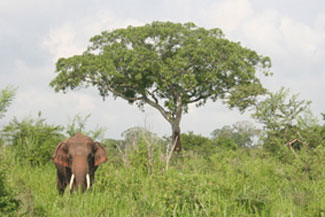A young tusker, about 20 years old, was shot dead two weeks ago. The elephant was found inside the Uda Walawe National Park, as reported in The Sunday Times.
Visitors to this park and passersby are quite familiar with male elephants coming up to the electric fence that borders the Uda Walawe-Thanamalwila road. These elephants have become accustomed to being fed by the villagers, and the villagers do this to attract people and make some money.
This practice started about five years ago when one mature male elephant started frequenting the area close to the electric fence. The elephants would pick up the tidbits thrown to them.
Many wild life enthusiasts brought the matter to the notice of the authorities. I wrote at the time to the newspapers, warning of the potential dangers.
As expected, nothing really effective was done by the Department of Wildlife Conservation to stop this practice. Gradually, the number grew, and five to six male elephants would regularly appear and take their places along the wire fence.
The elephant shot recently was one of four tuskers seen regularly in the park. Of the four, three are intermittent visitors to the park, coming in most often when they are in musth (musth is a periodic condition in bull elephants, characterised by highly aggressive behaviour).
This young tusker, first sighted in 2007, was the resident of the four animals, and he was maturing into a majestic animal.
This tusker must have recently stumbled on the option of getting tasty food at the park boundary electric fence, and started to frequent the area.
It was reported that gunshots were heard during the night. The elephant was later found dead inside the park, with injuries to its body.
In all probability, someone would have shot the animal when he was close to the fence, in the hope that the elephant would fall down dead right there, where his tusks could be quickly removed. The tusker did not die at the fence. It died of its wounds a few days later inside the park. Its tusks were still intact.
Only male Asian elephants sprout tusks (in the African species, both the male and the female have tusks). It is estimated that not more than 6 to 7 percent of the males in the Sri Lankan sub-species have tusks. The very few remaining tuskers are under grave threat: Should they live to adulthood, they will be at high risk.
No matter how much the living tusker is appreciated for its iconic value, and how great the sympathy and goodwill of the general public, it is a sad fact that these young tuskers are easy target to poachers, especially those animals that grow up in the park, around people.
Most of these animals have the good sense to stay hidden, but it is common knowledge that when they come into musth they increase their territorial range and often come into conflict with humans.
This young tusker’s friendliness may, therefore, have cost him his life.
It takes only one person with a gun to destroy the hopes and future of a species.
If and when the young ones die, and the wise old bulls (who are cunning enough to survive amongst people) pass on, the reign of tuskers will be over, not only in the Uda Walawe National Park but all over this wonderful island of ours.
This same story is likely being played out elsewhere in the country.
The time of Sri Lanka’s tuskers may be nearing its end.
|

